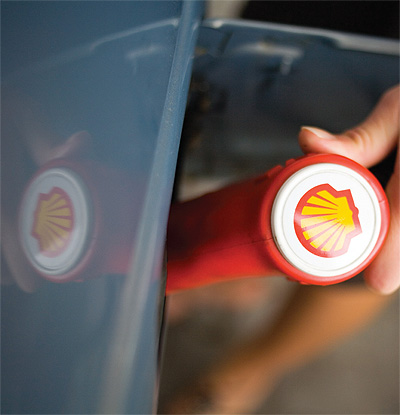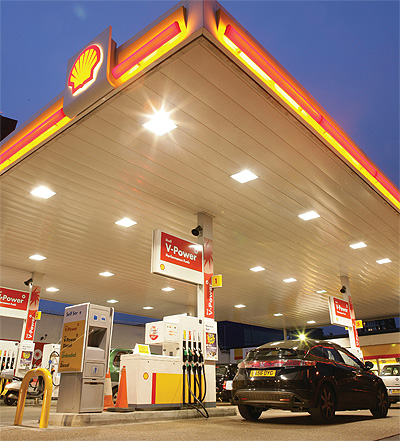Shell South Africa
Heart of Africa
Shell South Africa is part of the Royal Dutch Shell Group and began trading in South Africa in 1902, focusing on paraffin and kerosene. The company was the first to provide light and heat to communities across Southern Africa.
Shell Group is a frontrunner in the international oil and gas industry, operating in over 100 countries with more than 102,000 employees and nearly 45,000 service stations worldwide. Almost ten million customers around the world use its fuels every day. Royal Dutch Shell produces two per cent of the world’s oil and three per cent of the world’s gas, creating 3.2 million barrels of oil and gas each day. This year, Fortune 500 ranked the organisation number one.
The Shell group of energy and petrochemical companies aims to meet the energy needs of society in ways that are economically, socially and environmentally viable, now and in the future. Being part of such an internationally recognised brand and one that is known for its products, customer care and responsible approach to energy challenges, gives Shell South Africa a firm footing for progression.

Shell operates a number of oil-related businesses in the South African market, including fuel retailing, aviation, marine, commercial fuels and bitumen, and liquefied petroleum gas. Shell’s companies in South Africa employ nearly 1400 people, and operate about 750 retail service stations, with a market share of nearly 20 per cent. The South African oil industry as a whole creates some $1.5 billion per annum of economic value and sells approximately 26 billion litres of fuel annually.
Shell South Africa refines product through the 180,000 barrels per day SAPREF refinery, a joint venture with BP. Shell also blends lubricants in a joint venture blending facility in Durban at Blendcor, and at Cera, its blending plant in Gauteng.
In 2007, Shell was rated best employer in South Africa following a survey by the Corporate Research Foundation and was also recognised by the Orange Index as the best petrochemicals company in the country. The company’s South African head office is in Bryanston, Johannesburg.
As part of the South African government’s Cleaner Fuels Programme, Shell’s fuels in South Africa have been changing since 2006 in order to meet the growing need for more eco-friendly fuels. Some of the changes included the phasing out of leaded fuel, the lowering of sulphur levels in diesel, and the launch of new fuels in certain areas of the Shell network. The company gained confidence from the fact that it has achieved the phasing out of leaded fuel in over 50 markets worldwide, and drawing on this experience ensures customers continue to have a high quality, reliable product. Shell South Africa also launched a comprehensive Cleaner Fuels campaign to educate motorists on the benefits of cleaner fuels. From December 2005, every Shell service station in Southern Africa was installed with a fuel advisor to assist customers with their choice of fuel. This initiative helped to bring Shell South Africa in line with its global fuels strategy.
Shell is the leading brand in terms of brand preference in the South African petroleum industry. The company has been able to maintain this position over the years because it has lived up to its commitment to meet and exceed customers’ requirements for energy products. This, Shell has done through extensive customer research, understanding their needs, and providing appropriate products to meet these needs.
Shell is also a leader in providing differentiated fuels in the South African market. The company was the first to introduce branded differentiated fuels in 2000 through Shell V-Power 95, Shell V-Power Diesel, Shell Diesel Extra and Shell Unleaded Extra. Both Unleaded Extra and Diesel Extra fuels have been extensively tested for their added benefits. Test results have shown a significant average fuel economy benefit, when compared with untreated fuel.
This new portfolio of cleaner fuels in South Africa is specially designed to clean engines, giving customers optimum performance and power. Shell Diesel Extra maintains long-term performance by protecting against corrosion. Shell Unleaded Extra is designed to help customers get the best value out of their vehicles by giving engine protection at no extra cost. Whilst ordinary petrol can lead to harmful deposits and rust build up, this product is developed to clean and protect by forming a defensive layer over key parts of an engine. Furthermore, since it is a 93-octane fuel, it is not subject to the special fuels levy that limits the sale of 95-octane fuel to the inland market area. This also fits in with Shell’s ‘Get the Most out of Every Drop’ formula that is intended to give customers extra kilometres at no extra cost, a key benefit in the current global economic climate.
The Shell Group has a number of major investments worldwide that are aimed at increasing the organisation’s capacity and capability across continents. At a time when many medium-sized and small companies have already announced 15-25 per cent investment reductions, Shell is keeping its level of spending as high as in the last boom year in 2008 as CEO Peter Voser explained: “Our strategy is unchanged; we don’t believe in a stop-and-go investment policy. So we are still on track with our plans to invest $31–$32 billion this year. We are successfully negotiating better conditions from suppliers and contractors. These could have an effect in the next 12 to 18 months and could influence our investment levels in 2010 and 2011, but it’s still too early to tell at this point in time.”
One of the latest projects for Shell South Africa involves the planned maintenance shutdown of SAPREF, South Africa’s largest oil refinery, which is jointly owned by Shell and BP. Planning for the shutdown began two years ago and has been a major organisational focus for this year – the project will last less than two months having started in July. SAPREF goes through this kind of maintenance project every four years to ensure the safety, reliability and integrity of its equipment. Several of the main process units will be shut down for inspection, maintenance, catalyst change and cleanout, and replacement of a reactor, column and four vessels will take place.
Located at the South Durban Basin – a major industrial area spanning from the port of Durban in the north, to Umbongintwini in the south and inland as far as the South Coast Road corridor –  SAPREF contributes about nine per cent to South Africa’s gross domestic product. Its facilities include vast storage at the harbour, a single buoy mooring where tankers offload about 78 per cent of South Africa’s crude oil imports, and joint bunkering services that are operated on behalf of a range of different petroleum companies. BP and Shell are working to ensure that the supply of fuel and other products continue uninterrupted during the maintenance period.
SAPREF contributes about nine per cent to South Africa’s gross domestic product. Its facilities include vast storage at the harbour, a single buoy mooring where tankers offload about 78 per cent of South Africa’s crude oil imports, and joint bunkering services that are operated on behalf of a range of different petroleum companies. BP and Shell are working to ensure that the supply of fuel and other products continue uninterrupted during the maintenance period.
In the South African market, Shell’s sustainable development policies find expression through its commitment to Black Economic Empowerment (BEE). Shell has engaged in empowerment initiatives since 1996, which means that it is already enjoying the benefits of a workforce comprising people from diverse backgrounds, with diverse identities and cultures.
Shell is also a signatory to the Petroleum and Liquid Fuels Industry BEE Charter of 2000. As early as 1998, Shell South Africa had embarked on a refinery processing deal with its BEE partner, Thebe Investment Corporation. This deal was followed by an aviation marketing joint venture with Thebe in 2001. In 2002, Thebe acquired a 25 per cent interest in Shell South Africa Marketing (Pty) Ltd and in 2008, Thebe’s equity participation was extended to Shell’s entire value chain by acquisition of 25 per cent of Shell South Africa Refining (Pty) Ltd, which owns Shell’s refining interests in the country.
As the global economic climate begins to gain stability, and investment in South Africa is starting to pick up again, Shell’s potential to grow its global influence is looking bright.
Shell South Africa seeks a high standard of performance from all of its 1400 employees, working under an international brand that has become synonymous with quality and care throughout the globe. Maintaining a strong long-term and growing position in the competitive environments in which it operates is at the heart of Shell’s philosophy. This can only be achieved by the building of solid relationships with the communities, companies, suppliers and partners with whom it works. The organisation holds the viewpoint that energy is to the modern society what food is to the individual – it is absolutely essential sustenance, and yet there are growing concerns about how energy products affect the environment and people’s lives. Shell believes that its activities do not lead to unsustainable social differences but create wealth that can benefit society as a whole. The company is focused on developing the oil and gas industry in a way that means future generations stand to benefit as well.
With a focus on innovation in the coming years that includes creating products for managing emissions and investigating alternative energies whilst at the same time meeting the demands of its distinct client base for efficient and clean fuels, the Shell Group has technology centres scattered across the globe. With progression at its heart, the organisation will strive for development in key areas such as South Africa in order to continue to do its part to safeguard the planet for a common future.
Shell South Africa
Products: Fuel, gas, lubricants and chemicals